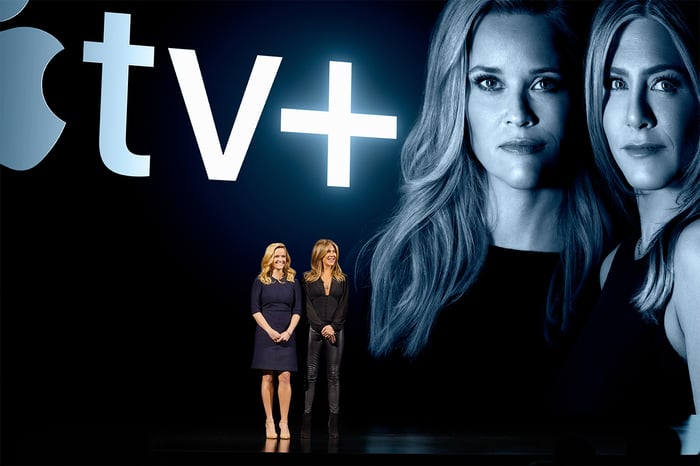Apple (AAPL -1.22%) plans to launch its streaming video service, Apple TV+, for $4.99 a month in November. It's also offering a free year of access to anyone who buys a new iPhone, iPad, iPod Touch, Apple TV, or Mac.
Apple is undercutting all its rival services -- including Netflix, Amazon Prime Video, and Disney+ -- in the streaming market. However, Financial Times recently claimed that Apple could go a step further and merge Apple TV+ and Apple Music in a new bundle.

Image source: Apple.
Apple Music currently costs $9.99 a month, and the FT report claims that the combined bundle could cost $13. There's also talk about a "super bundle" of services that would bring Apple News+ and Apple Arcade onboard.
Apple's strategy would propel it toward its target of generating $50 billion in annual services revenue by 2020. It would also strengthen the walls of its ecosystem and lock in revenue-generating users as its hardware sales decelerate. However, Apple's media bundles could also hurt Spotify (SPOT -4.62%) and spark protests from record labels.
Running its media platforms as loss leaders
Spotify ended last quarter with 108 million paid subscribers and 129 million ad-supported monthly active users. Apple Music, which only operates as a paid service, hit 60 million subscribers in June.
Apple Music, Spotify, and other streaming platforms all previously paid 10.5% of their revenues as royalties to record companies. Last year, the Copyright Royalty Board (CRB) ruled that the rate would gradually rise to 15.1% by 2022.
Apple doesn't disclose Apple Music's revenue growth or profitability, but its margins probably aren't much better than Spotify's. Spotify posted a gross margin of 26% last quarter, but its operating margin stayed in the red at negative 0.2% due to higher labor costs, payroll taxes, and stock-based compensation expenses.
Apple doesn't need Apple Music to be profitable, since it can offset the unit's losses with more profitable services like the App Store. Instead, Apple views Apple Music as another way to lock users into its walled garden of services, ensure that they keep buying Apple devices, and boost its revenue per user as its hardware sales decelerate.
The same logic applies to Apple TV+. That's why it reportedly spent $6 billion on the platform's initial lineup of shows. At $60 per year, it would need 100 million members to break even on its initial investment -- which seems unlikely with that many competitors in the market.

Image source: Apple.
Simply put, Apple is willing to run Apple Music and Apple TV as loss leaders to expand its ecosystem. Bundling both services, along with Arcade and News, into a single service would complement that strategy. Apple's move seems to target big tech rivals like Amazon and Alphabet's Google, which both bundle their streaming video and music services together -- but it could also hurt stand-alone streaming players like Spotify.
Why Spotify should worry
Apple's bundles could appeal to its iPhone owners, who account for 13% of the world's smartphone market, according to IDC. It could also be an attractive choice for Apple TV owners, who comprised 13% of the U.S. set-top box market last year, according to eMarketer.
Meanwhile, Spotify's average revenue per paid subscriber has been declining in recent years due to shifts in its product and geographic mix. In other words, Spotify is expanding aggressively into lower-income markets, where it charges significantly less than its $10 per month fee in the U.S.
If Apple goes through with its bundling plans, it could force Spotify to lower its prices in higher income markets like the U.S., which would reduce its average revenue per subscriber and squeeze its margins.
But record labels could stop Apple's master plan
This all sound like bad news for Spotify, but Financial Times claims that at least one major record label opposes Apple's plans. The reason is simple: The proposed bundle reduces Apple Music's total revenue, which would reduce the record labels' percentage-based cut. If other platforms are forced to match Apple's prices, the record labels would generate lower royalties.
Apple's master plan won't work without the support of the big three record labels -- Warner Music Group, Sony Music Entertainment, and Universal Music Group -- so their unwillingness to change the status quo could shield Spotify from Apple's ambitions. But if Apple wins over the labels, Spotify investors should brace for a brutal pricing war and wider losses.





